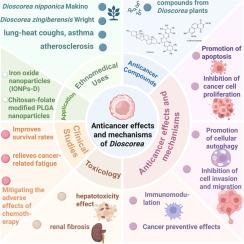Anticancer effects and mechanisms of genus Dioscorea: A review
IF 8.3
1区 医学
Q1 CHEMISTRY, MEDICINAL
引用次数: 0
Abstract
Background
Dioscorea, as a plant genus, possesses dual value for both medicinal and dietary purposes. Recently, numerous studies have demonstrated that the genus Dioscorea extracts (DEs) and their compounds (DCs) exhibit significant anticancer properties.
Purpose
This review summarizes pharmacological mechanisms, toxicology, and clinical studies of Dioscorea to evaluate its potential for novel anticancer drug development.
Methods
A systematic search was performed across PubMed, Web of Science, and CNKI databases. The search was conducted from the time of database construction to August 2024. A total of 1742 articles were searched, and after screening, 83 articles were finally included in this study.
Results
The analysis of 83 articles revealed that DEs and DCs exert their anticancer effects through six primary mechanisms: (1) promotion of apoptosis, (2) prevention of cancer cell proliferation, (3) suppression of tumor metastasis, (4) activation of autophagy, (5) modulation of immune responses, and (6) prevention of cancer development.
Conclusion
DCs and DEs exhibit broad-spectrum anticancer properties. In particular, dioscin exhibits low toxicity and exerts strong anticancer effects through multiple pathways and targets. Future studies should focus on investigating these DEs and DCs, especially dioscin, as a novel anticancer agent.

薯蓣属植物的抗癌作用及其机制研究进展
背景:薯蓣作为一种植物属,具有药用和食用双重价值。近年来,大量研究表明薯蓣提取物(DEs)及其化合物(DCs)具有显著的抗癌特性。目的:综述薯蓣的药理作用机制、毒理学及临床研究进展,评价其作为新型抗癌药物的开发潜力。方法:系统检索PubMed、Web of Science和CNKI数据库。检索时间为数据库建立之时至2024年8月。共检索文献1742篇,经筛选,最终纳入83篇。结果:对83篇文献的分析显示,DEs和DCs的抗癌作用主要通过6个机制:(1)促进细胞凋亡,(2)阻止癌细胞增殖,(3)抑制肿瘤转移,(4)激活自噬,(5)调节免疫反应,(6)预防肿瘤发生。结论:DCs和DEs具有广谱抗癌作用。特别是薯蓣皂苷具有低毒性,通过多种途径和靶点发挥强大的抗癌作用。今后的研究应重点关注这些DEs和dc,特别是薯蓣皂苷作为一种新的抗癌药物的研究。
本文章由计算机程序翻译,如有差异,请以英文原文为准。
求助全文
约1分钟内获得全文
求助全文
来源期刊

Phytomedicine
医学-药学
CiteScore
10.30
自引率
5.10%
发文量
670
审稿时长
91 days
期刊介绍:
Phytomedicine is a therapy-oriented journal that publishes innovative studies on the efficacy, safety, quality, and mechanisms of action of specified plant extracts, phytopharmaceuticals, and their isolated constituents. This includes clinical, pharmacological, pharmacokinetic, and toxicological studies of herbal medicinal products, preparations, and purified compounds with defined and consistent quality, ensuring reproducible pharmacological activity. Founded in 1994, Phytomedicine aims to focus and stimulate research in this field and establish internationally accepted scientific standards for pharmacological studies, proof of clinical efficacy, and safety of phytomedicines.
 求助内容:
求助内容: 应助结果提醒方式:
应助结果提醒方式:


